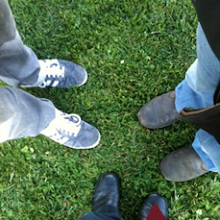Top 20 Animal Sleepers and Why We Sleep
August 21, 2009
by
Discovery News'
Jennifer Viegas
on the beast in all of us.
Did you have trouble getting out of bed this morning, with the soft pillows and warm covers tempting you to snooze for just a little longer? We pride ourselves on being the most industrious animals, but we humans spend about one third of our lives sleeping.
The question is: why?
Sleep duration, then, is determined in each species by the time requirements of eating, the cost-benefit relations between activity and risk, migration needs, care of young, and other factors. However, unlike hibernation and torpor, Siegel said, sleep is rapidly reversible — that is, animals can wake up quickly, a unique mammalian adaptation that allows for a relatively quick response to sensory signals.
What is most remarkable about sleep is not the unresponsiveness or vulnerability it creates but rather that ability to reduce body and brain metabolism while still allowing that high level of responsiveness to the environment.
"The often cited example is that of a parent arousing at a baby's whimper but sleeping through a thunderstorm," he said. "That dramatizes the ability of the sleeping human brain to continuously process sensory signals and trigger complete awakening to significant stimuli within a few hundred milliseconds."
Eric Chudler, a research associate professor in the Department of Bioengineering at the University of Washington, documented how long animals sleep.
Here are his top 20 sleepers with
percent of sleep during 24 hrs and number of hrs.
Brown Bat 82.9% 19.9 hr
Giant Armadillo 75.4% 18.1 hr
North American Opossum 75% 18 hr
Python 75% 18 hr
Owl Monkey 70.8% 17.0 hr
Human (infant) 66.7% 16 hr
Tiger 65.8% 15.8 hr
Squirrel 62% 14.9 hr
Western Toad 60.8% 14.6 hr
Ferret 60.4% 14.5 hr
Three-toed Sloth 60% 14.4 hr
Golden Hamster 59.6% 14.3 hr
Platypus 58.3% 14.0 hr
Lion 56.3% 13.5 hr
Rat 52.4% 12.6 hr
Cat 50.6% 12.1 hr
Cheetah 50.6% 12.1 hr
Duck 45% 10.8 hr
Dog 44.3% 10.6 hr
Star-nosed Mole 42.9% 10.3 hr
Human (adult) 33.3% 8 hr
African Elephant 16.4% 3.3 hr
Horse 12% 2.9 hr
Giraffe 7.9% 1.9 hr
Brown Bat 82.9% 19.9 hr
Giant Armadillo 75.4% 18.1 hr
North American Opossum 75% 18 hr
Python 75% 18 hr
Owl Monkey 70.8% 17.0 hr
Human (infant) 66.7% 16 hr
Tiger 65.8% 15.8 hr
Squirrel 62% 14.9 hr
Western Toad 60.8% 14.6 hr
Ferret 60.4% 14.5 hr
Three-toed Sloth 60% 14.4 hr
Golden Hamster 59.6% 14.3 hr
Platypus 58.3% 14.0 hr
Lion 56.3% 13.5 hr
Rat 52.4% 12.6 hr
Cat 50.6% 12.1 hr
Cheetah 50.6% 12.1 hr
Duck 45% 10.8 hr
Dog 44.3% 10.6 hr
Star-nosed Mole 42.9% 10.3 hr
Human (adult) 33.3% 8 hr
African Elephant 16.4% 3.3 hr
Horse 12% 2.9 hr
Giraffe 7.9% 1.9 hr
1.9 hr!
What!?
...

No comments:
Post a Comment